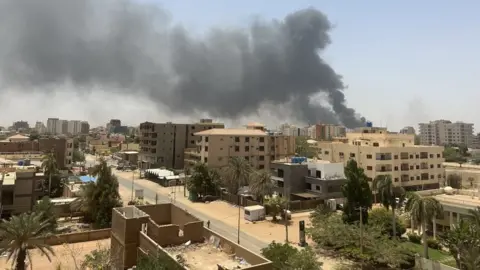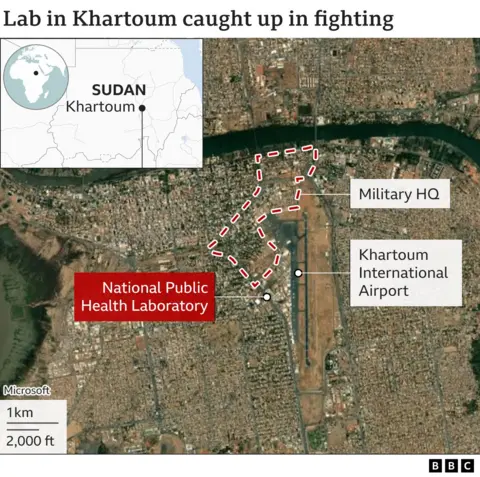Sudan crisis: WHO warns of biological hazard at seized lab
 Getty Images
Getty ImagesThe World Health Organization (WHO) says there's a "high risk of biological hazard" at a laboratory caught up in the ongoing conflict in Sudan.
Officials said it was unclear who was behind the occupation of the National Public Health Laboratory in the capital Khartoum.
The city has been ravaged by fighting between the army and the paramilitary Rapid Support Forces (RSF).
The WHO told the BBC on Tuesday that workers can no longer access the lab.
And it warned that power cuts were making it impossible to properly manage material at the lab.
Officials said that a broad range of biological and chemical materials are stored in the lab. The facility holds measles and cholera pathogens, as well as other hazardous materials.
A lack of power is also putting depleting stocks of blood bags stored at the lab at risk of spoiling.
In a press conference on Wednesday, WHO officials said it is conducting an "extensive" risk assessment of the potential public health threat following the seizure of the lab.
Fillipa Lentzos, Associate Professor in Science and International Security at King's College London, said: "It could create a risky situation, but it's a regular health lab, not a high containment facility.
"The agents which are in the lab are all diseases which are endemic in the region anyway, so they wouldn't really be classified as high risk," she told us.
Where is the lab?
The lab is near the centre of Khartoum and not far from city's main airport.
It lies just outside the area where Sudan's military headquarters are located, and where a lot of the fighting has been taking place.

The particular geography of Khartoum means key strategic sites which are being targeted, such as military buildings, are close to critical infrastructure.
Both the military headquarters and the airport are right next to a residential area, with several schools and hospitals nearby.
Only a fraction of health facilities in Khartoum are providing services due to a lack of staff, medicine and other supply shortages, power outages, or attacks.
The Federal Ministry of Health in Sudan has reported that 36% of health facilities in Khartoum city are non-functional and another 25% are unresponsive.

Sudan: The basics
- Sudan is in north-east Africa and has a history of instability: The military toppled long-time leader Omar al-Bashir in 2019 after mass protests
- It then overthrew a power-sharing government in 2021, putting two men at the helm: The head of the army and his deputy, who is also the head of a paramilitary group called the RSF
- They disagree on how to restore civilian rule to Sudan: The RSF leader claims to represent marginalised groups against the country's elites but his forces were accused of ethnic cleansing

Graphics by Kate Gaynor.
